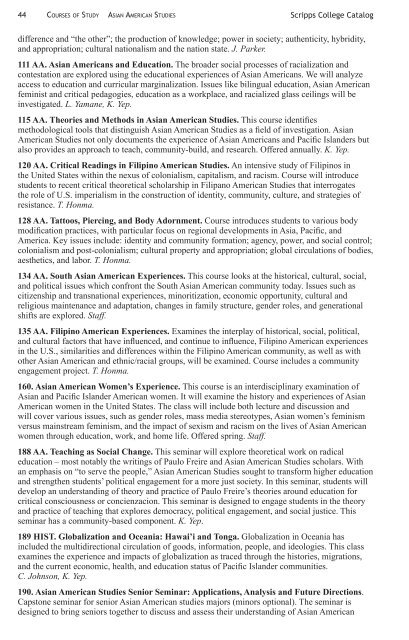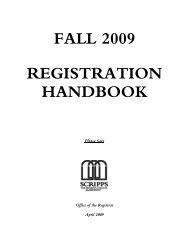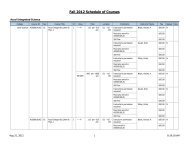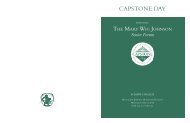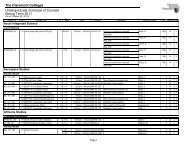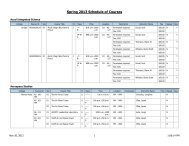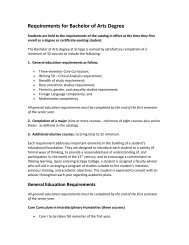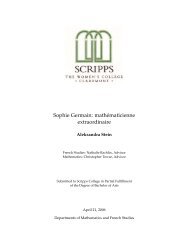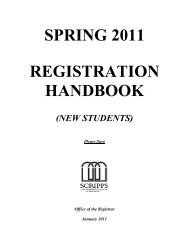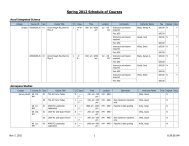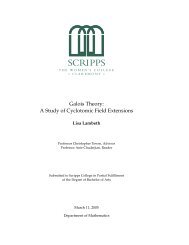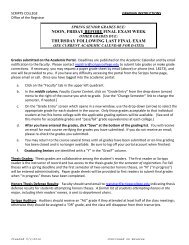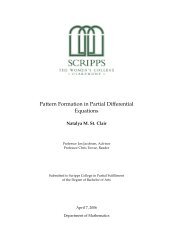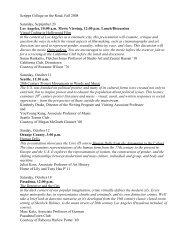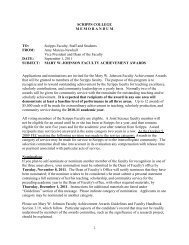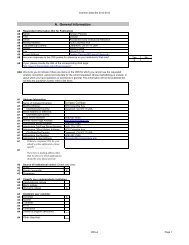PDF of the 2012-2013 Academic Catalog - Scripps College
PDF of the 2012-2013 Academic Catalog - Scripps College
PDF of the 2012-2013 Academic Catalog - Scripps College
You also want an ePaper? Increase the reach of your titles
YUMPU automatically turns print PDFs into web optimized ePapers that Google loves.
44 Courses <strong>of</strong> Study Asian American Studies <strong>Scripps</strong> <strong>College</strong> <strong>Catalog</strong><br />
difference and “<strong>the</strong> o<strong>the</strong>r”; <strong>the</strong> production <strong>of</strong> knowledge; power in society; au<strong>the</strong>nticity, hybridity,<br />
and appropriation; cultural nationalism and <strong>the</strong> nation state. J. Parker.<br />
111 AA. Asian Americans and Education. The broader social processes <strong>of</strong> racialization and<br />
contestation are explored using <strong>the</strong> educational experiences <strong>of</strong> Asian Americans. We will analyze<br />
access to education and curricular marginalization. Issues like bilingual education, Asian American<br />
feminist and critical pedagogies, education as a workplace, and racialized glass ceilings will be<br />
investigated. L. Yamane, K. Yep.<br />
115 AA. Theories and Methods in Asian American Studies. This course identifies<br />
methodological tools that distinguish Asian American Studies as a field <strong>of</strong> investigation. Asian<br />
American Studies not only documents <strong>the</strong> experience <strong>of</strong> Asian Americans and Pacific Islanders but<br />
also provides an approach to teach, community-build, and research. Offered annually. K. Yep.<br />
120 AA. Critical Readings in Filipino American Studies. An intensive study <strong>of</strong> Filipinos in<br />
<strong>the</strong> United States within <strong>the</strong> nexus <strong>of</strong> colonialism, capitalism, and racism. Course will introduce<br />
students to recent critical <strong>the</strong>oretical scholarship in Filipano American Studies that interrogates<br />
<strong>the</strong> role <strong>of</strong> U.S. imperialism in <strong>the</strong> construction <strong>of</strong> identity, community, culture, and strategies <strong>of</strong><br />
resistance. T. Honma.<br />
128 AA. Tattoos, Piercing, and Body Adornment. Course introduces students to various body<br />
modification practices, with particular focus on regional developments in Asia, Pacific, and<br />
America. Key issues include: identity and community formation; agency, power, and social control;<br />
colonialism and post-colonialism; cultural property and appropriation; global circulations <strong>of</strong> bodies,<br />
aes<strong>the</strong>tics, and labor. T. Honma.<br />
134 AA. South Asian American Experiences. This course looks at <strong>the</strong> historical, cultural, social,<br />
and political issues which confront <strong>the</strong> South Asian American community today. Issues such as<br />
citizenship and transnational experiences, minoritization, economic opportunity, cultural and<br />
religious maintenance and adaptation, changes in family structure, gender roles, and generational<br />
shifts are explored. Staff.<br />
135 AA. Filipino American Experiences. Examines <strong>the</strong> interplay <strong>of</strong> historical, social, political,<br />
and cultural factors that have influenced, and continue to influence, Filipino American experiences<br />
in <strong>the</strong> U.S., similarities and differences within <strong>the</strong> Filipino American community, as well as with<br />
o<strong>the</strong>r Asian American and ethnic/racial groups, will be examined. Course includes a community<br />
engagement project. T. Honma.<br />
160. Asian American Women’s Experience. This course is an interdisciplinary examination <strong>of</strong><br />
Asian and Pacific Islander American women. It will examine <strong>the</strong> history and experiences <strong>of</strong> Asian<br />
American women in <strong>the</strong> United States. The class will include both lecture and discussion and<br />
will cover various issues, such as gender roles, mass media stereotypes, Asian women’s feminism<br />
versus mainstream feminism, and <strong>the</strong> impact <strong>of</strong> sexism and racism on <strong>the</strong> lives <strong>of</strong> Asian American<br />
women through education, work, and home life. Offered spring. Staff.<br />
188 AA. Teaching as Social Change. This seminar will explore <strong>the</strong>oretical work on radical<br />
education – most notably <strong>the</strong> writings <strong>of</strong> Paulo Freire and Asian American Studies scholars. With<br />
an emphasis on “to serve <strong>the</strong> people,” Asian American Studies sought to transform higher education<br />
and streng<strong>the</strong>n students’ political engagement for a more just society. In this seminar, students will<br />
develop an understanding <strong>of</strong> <strong>the</strong>ory and practice <strong>of</strong> Paulo Freire’s <strong>the</strong>ories around education for<br />
critical consciousness or concienzacion. This seminar is designed to engage students in <strong>the</strong> <strong>the</strong>ory<br />
and practice <strong>of</strong> teaching that explores democracy, political engagement, and social justice. This<br />
seminar has a community-based component. K. Yep.<br />
189 HIST. Globalization and Oceania: Hawai’i and Tonga. Globalization in Oceania has<br />
included <strong>the</strong> multidirectional circulation <strong>of</strong> goods, information, people, and ideologies. This class<br />
examines <strong>the</strong> experience and impacts <strong>of</strong> globalization as traced through <strong>the</strong> histories, migrations,<br />
and <strong>the</strong> current economic, health, and education status <strong>of</strong> Pacific Islander communities.<br />
C. Johnson, K. Yep.<br />
190. Asian American Studies Senior Seminar: Applications, Analysis and Future Directions.<br />
Capstone seminar for senior Asian American studies majors (minors optional). The seminar is<br />
designed to bring seniors toge<strong>the</strong>r to discuss and assess <strong>the</strong>ir understanding <strong>of</strong> Asian American


